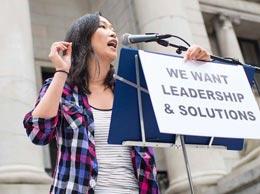Vancouver residents rally against soaring house prices

Photo : Twitter #donthave1million
Jagdeesh Mann
Special to The Post
Vancouverites rallied this past weekend against the soaring cost of housing in the city.
The event was organized by Eveline Xia of Vancouverites for Affordable Housing, an organisation that describes itself as "your everyday residents and citizens who believe that the housing affordability crisis is damaging the long-term health of our beloved city."
The rally featured speeches by Paul Kershaw, founder of Generation Squeeze and Xia. It is Xia who recently has been at the centre of a media storm after she founded the hashtag #DontHave1Million only to have it used by group of Vancouver realtors.
In this past year, another frenzy of sales in the real estate market has driven already out-of-reach prices up to astronomic levels, making Vancouver the most expensive city in North America – ahead of even San Francisco and New York.
Where those latter cities are commercial centres – with Silicon Valley and Wall Street respectively – Vancouver, Canada’s 3rd largest city, has no commercial base of its own to justify its cost of living.
The average house price of a two level detached home is C$1.27 million, according to the Royal LePage House Price Survey.
The average income in Vancouver meanwhile, according to Statistics Canada, is
C$28,726. For a couple earning an average income, a basic home in Vancouver is 26 times their combined yearly income, a multiple that is comparable to global centres of inequality like Hong Kong and Mumbai – both Asian centres where extreme inequality is the norm.
Meanwhile, British Columbia’s provincial government has clearly expressed it will not tax or curb the inflow of offshore money – most notably coming in from China and Hong Kong– which is seen as being the cause of Vancouver ‘property bubble’.
B.C. Housing Minister Rich Coleman has said the province has no plans to collect data on foreign ownership, incredulously stating that housing costs in B.C. are “pretty reasonable” – an comment made in response to a question posed by Vancouver-Point Grey NDP MLA David Eby.
Coleman fell back on what has become the usual response of the BC government – one that has grown overly dependent of foreign wealth to raise the “paper equity” of local homeowners.
“I believe that the market place adjusts. If you notice over the years, it has fluctuations up and fluctuations down,” said Coleman.
“If you look at the mean cost of housing across British Columbia and you compare it to other major cities worldwide, the reason it is attractive internationally is because it’s actually pretty reasonable compared to other cities like London, Singapore, Tokyo.”
Vancouver Mayor Gregor Robertson who did not attend the weekend rally, did release a statement that contradicted the position of the provincial Liberals.
"I hear on a daily basis from people who are struggling to stay in the city, whether it's finding a decent place to rent for their family or a modest home to make an entry into the housing market. This conversation needs to happen and I hear the concerns loud and clear — and I hope the provincial and federal governments are listening too."
Robertson said the city is doing what it can to shift the housing market towards affordability, but more action is required by provincial and federal governments.
Even Vancouver’s uber real-estate marketer Bob Rennie stated recently in a speech to the Urban Development Institute that he recommends a tax on speculation in order to stem the rampant inflation of prices.
Gregor Robertson has also expressed favour for a speculation tax, and has suggested it as an option to B.C. Premier Christy Clark, he stated last week.
The tax would be another step forward in ensuring Vancouver remains the greenest city in the world by preventing money of uncertain origin and legality from tainting the city’s environmental standard.
With buyers from Asia paying for multi-million dollar properties in cash, Vancouver is increasingly awash in money of questionable origin with unknown human and environmental cost.
According to local policy-makers, the efforts of countries like China to crackdown on corruption and prevent ill-gotten wealth from being laundered overseas in the Vancouver real estate market will have limited effect if BC's politicians do not do their part and treat their addiction to easy offshore money.









